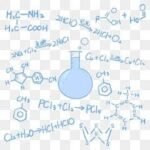Chemistry and Molecular Biology: Illuminating the Secrets of Life
Welcome to our website, where we explore the fascinating intersection of chemistry and molecular biology. Chemistry plays a vital role in unraveling the intricate mechanisms of life at the molecular level. Join us as we delve into the world of chemistry and molecular biology, uncovering the essential connections, breakthroughs, and impact they have on our understanding of life.

- Biomolecules: Chemistry provides the foundation for understanding the structure, function, and interactions of biomolecules, such as proteins, nucleic acids, carbohydrates, and lipids. Chemists study the chemical properties and synthesis of these molecules, while molecular biologists explore their roles in cellular processes, gene expression, and disease mechanisms.
- Enzymes and Catalysis: Chemistry drives the study of enzymes, which are biological catalysts that facilitate chemical reactions in living organisms. Chemists investigate enzyme mechanisms, substrate specificity, and kinetics, while molecular biologists explore the regulation and function of enzymes in cellular pathways. Understanding enzyme catalysis is crucial for drug design, biotechnology, and the development of therapeutic strategies.
- Metabolism: Chemistry plays a critical role in understanding metabolic pathways and the transformation of molecules within cells. Chemists study the chemical reactions involved in energy production, biosynthesis, and the breakdown of biomolecules. Molecular biologists explore how these metabolic processes are regulated, providing insights into diseases such as diabetes, cancer, and metabolic disorders.
- Drug Discovery and Development: Chemistry and molecular biology intersect in the field of drug discovery and development. Chemists design and synthesize small molecules or biologics that interact with specific molecular targets to treat diseases. Molecular biologists validate these targets and study the molecular mechanisms of drug action, contributing to the development of novel therapies and personalized medicine.
- DNA and Gene Expression: Chemistry plays a pivotal role in understanding DNA structure, replication, and gene expression. Chemists study the chemical synthesis and modification of DNA, while molecular biologists investigate the regulation of gene expression and the role of DNA in inheritance, development, and disease. This knowledge is essential for genetic engineering, diagnostics, and gene therapy.
- Proteomics and Structural Biology: Chemistry and molecular biology intersect in the field of proteomics, where the study of proteins and their structures is critical. Chemists develop techniques for protein isolation, purification, and analysis, while molecular biologists employ these methods to unravel protein functions, interactions, and three-dimensional structures. This knowledge aids in drug discovery, protein engineering, and understanding disease mechanisms.
- Biotechnology and Synthetic Biology: Chemistry and molecular biology converge in biotechnology and synthetic biology, where biological systems are engineered for practical applications. Chemists contribute to the design and synthesis of DNA, enzymes, and other biomolecules for genetic manipulation and the creation of new biological systems. Molecular biologists harness these tools for the production of biopharmaceuticals, biofuels, and the development of biosensors.
At our website, we explore the fascinating world of chemistry and molecular biology, unraveling the connections, discoveries, and impact they have on our understanding of life. Join us as we delve into biomolecules, enzymes, metabolism, drug discovery, DNA, gene expression, proteomics, and biotechnology. Welcome to a place where chemistry and molecular biology illuminate the secrets of life.

